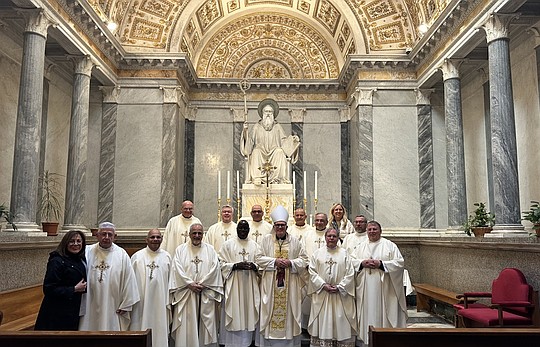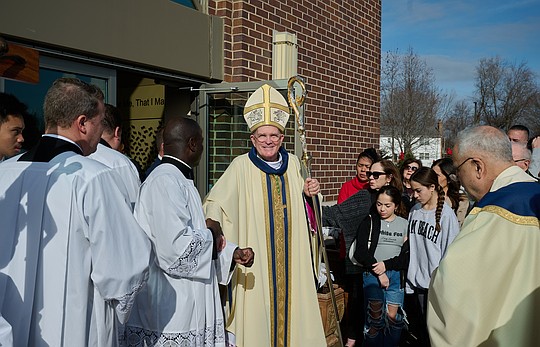Question Corner: Can laypeople ever absolve sins? Chanting in 'Novus Ordo'
February 28, 2023 at 4:34 p.m.

Q: If someone is dying, can anyone hear their confession and offer absolution? (Fredericksburg, PA)
A: No. Only an ordained priest has the power to forgive sins sacramentally in Jesus' name. Even in an emergency, non-ordained laypeople are not able to confer absolution; nor can Catholic deacons, even though they are ordained.
Interestingly (and only if there is a real danger of imminent death), a priest who, for a variety of reasons, may have lost his priestly faculties can still validly confer sacramental absolution upon a dying penitent. A "faculty" in this sense is the permission from the legitimate authority, (generally the local diocesan bishop), for a priest to celebrate certain sacraments. For some sacraments, including the sacrament of penance, this faculty is needed not only so that the sacrament may be licit, but also for its validity (see Canon 966 of the Code of Canon Law).
To be sure, most parish priests you encounter will indeed have the faculty to hear confessions. A priest might lack this faculty in a few unusual scenarios, such as being deemed incapable of the good judgment needed to counsel penitents appropriately (e.g., perhaps due to severe physical or mental illness), or if he is under some sort of canonical punishment like excommunication. In some situations even a priest in good standing may not have the faculty to absolve certain egregiously grave sins (such desecration of the Blessed Sacrament or making an attempt on the life of the Pope) in a particular instance.
However, in danger of death, the Church's law itself is the authority giving the faculty to grant sacramental absolution. As we read in Canon 976: "Even though a priest lacks the faculty to hear confessions, he absolves validly and licitly any penitents whatsoever in danger of death from any censures and sins, even if an approved priest is present."
That being said, hopefully you never find yourself in danger of death and without a priest! If this happens, the best thing to do is make a sincere act of contrition and have trust in God's mercy. But this also underscores the importance of going to confession regularly, so that we're always as prepared as we can be should the unexpected happen.
Q: Our whole Mass is the "Novus Ordo" in English but the pastor insists on using Kyrie eleison and also has us chanting the "Lamb of God" prayer in Latin. Does this invalidate the Mass? (Ocean Pines, MD)
A: It's perfectly valid to use Latin chant in the "Novus Ordo" Mass.
Often Catholics will refer to the pre-Vatican II missal as the "TLM" or "Traditional Latin Mass," but this is somewhat of a misnomer. All our liturgical prayers are originally written in Latin, and translations are always made from this Latin "master copy." So technically, the "Novus Ordo" is also a Latin Mass.
As Latin "Roman" Catholics, whose faith comes to us by way of the ministry of the apostle Peter as the first bishop of Rome, Latin is our traditional liturgical language. Even while it's important that we be able to follow along with the liturgy and understand what we are praying, it's also good to keep in touch with our heritage. As the Second Vatican Council document "Sacrosanctum Concilium" says: " … steps should be taken so that the faithful may also be able to say or to sing together in Latin those parts of the Ordinary of the Mass which pertain to them" (No. 54).
Jenna Marie Cooper, who holds a licentiate in canon law, is a consecrated virgin and a canonist whose column appears weekly at OSV News. Send your questions to [email protected].
Related Stories
Friday, January 02, 2026
E-Editions
Events
Q: If someone is dying, can anyone hear their confession and offer absolution? (Fredericksburg, PA)
A: No. Only an ordained priest has the power to forgive sins sacramentally in Jesus' name. Even in an emergency, non-ordained laypeople are not able to confer absolution; nor can Catholic deacons, even though they are ordained.
Interestingly (and only if there is a real danger of imminent death), a priest who, for a variety of reasons, may have lost his priestly faculties can still validly confer sacramental absolution upon a dying penitent. A "faculty" in this sense is the permission from the legitimate authority, (generally the local diocesan bishop), for a priest to celebrate certain sacraments. For some sacraments, including the sacrament of penance, this faculty is needed not only so that the sacrament may be licit, but also for its validity (see Canon 966 of the Code of Canon Law).
To be sure, most parish priests you encounter will indeed have the faculty to hear confessions. A priest might lack this faculty in a few unusual scenarios, such as being deemed incapable of the good judgment needed to counsel penitents appropriately (e.g., perhaps due to severe physical or mental illness), or if he is under some sort of canonical punishment like excommunication. In some situations even a priest in good standing may not have the faculty to absolve certain egregiously grave sins (such desecration of the Blessed Sacrament or making an attempt on the life of the Pope) in a particular instance.
However, in danger of death, the Church's law itself is the authority giving the faculty to grant sacramental absolution. As we read in Canon 976: "Even though a priest lacks the faculty to hear confessions, he absolves validly and licitly any penitents whatsoever in danger of death from any censures and sins, even if an approved priest is present."
That being said, hopefully you never find yourself in danger of death and without a priest! If this happens, the best thing to do is make a sincere act of contrition and have trust in God's mercy. But this also underscores the importance of going to confession regularly, so that we're always as prepared as we can be should the unexpected happen.
Q: Our whole Mass is the "Novus Ordo" in English but the pastor insists on using Kyrie eleison and also has us chanting the "Lamb of God" prayer in Latin. Does this invalidate the Mass? (Ocean Pines, MD)
A: It's perfectly valid to use Latin chant in the "Novus Ordo" Mass.
Often Catholics will refer to the pre-Vatican II missal as the "TLM" or "Traditional Latin Mass," but this is somewhat of a misnomer. All our liturgical prayers are originally written in Latin, and translations are always made from this Latin "master copy." So technically, the "Novus Ordo" is also a Latin Mass.
As Latin "Roman" Catholics, whose faith comes to us by way of the ministry of the apostle Peter as the first bishop of Rome, Latin is our traditional liturgical language. Even while it's important that we be able to follow along with the liturgy and understand what we are praying, it's also good to keep in touch with our heritage. As the Second Vatican Council document "Sacrosanctum Concilium" says: " … steps should be taken so that the faithful may also be able to say or to sing together in Latin those parts of the Ordinary of the Mass which pertain to them" (No. 54).
Jenna Marie Cooper, who holds a licentiate in canon law, is a consecrated virgin and a canonist whose column appears weekly at OSV News. Send your questions to [email protected].










